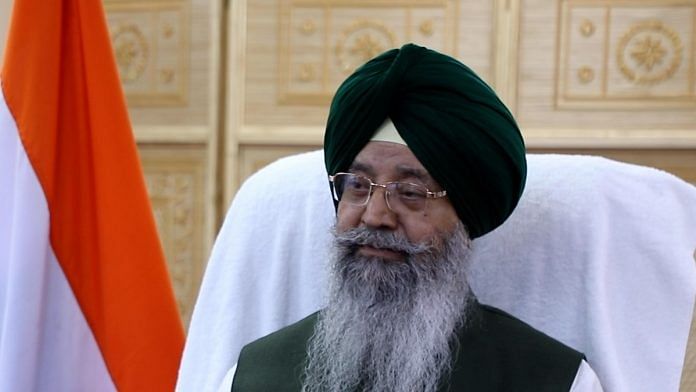New Delhi: Prime Minister Narendra Modi is a “better Sikh than most of us”, former IPS officer-turned-BJP leader Iqbal Singh Lalpura has said.
In an interview with ThePrint, Lalpura, a former deputy inspector general of Punjab Police, who was appointed to the BJP parliamentary board in August, called for more efforts to “heal” the wounds of the Sikhs.
Lalpura cited the Modi government’s initiatives — such as the opening of the Kartarpur Corridor in 2019 and the removal of Sikh foreign nationals from a secret blacklist that same year — to claim that the government was doing “everything” for the Sikhs, a community to which he belongs.
“The blacklist of Sikh foreign nationals has been removed. We’re giving them jobs. The Modi government is doing everything. Modiji is always available for Sikhs,” Lalpura, who’s also chairman of the National Commission for Minorities, said.
“We love Sikhs and are ready to do anything for them. Modiji had announced he was taking back the farm laws on Guru Nanak Dev’s birthday. He’s a better Sikh than most of us,” Lalpura further said, adding that the BJP has a plan for “peaceful co-existence” with the Sikhs.
In 1981, Lalpura, then the senior superintendent of police (SSP) from Tarn Taran, was one of three officers who arrested Sikh militant leader Jarnail Singh Bhindranwale in connection with a case related to a clash between Sikhs and Nirankaris.
The wounds from Punjab’s militancy days are still fresh in the minds of Sikhs, Lalpura said, adding that this is especially true for those whose family members were either killed or arrested under the Terrorist and Disruptive Activities (Prevention) Act (TADA) — an erstwhile anti-terrorism law that was in force in the days of Punjab’s militancy. The draconian legislation gave law enforcement agencies wide search, seizure, and arrest powers.
Also Read: How Punjabi journalists became ‘willing tool’ for extremists and police after Blue Star
‘Truth Reconciliation Commission’
Not much has been done to heal the wounds of the Sikhs who lost their loved ones during the militancy era, Lalpura said.
“Around 10,000 Sikhs were killed [during the militancy period], and 15,000 were arrested. The family of those 25,000 still hold a grudge. We need to talk to them and efforts are being made,” Lalpura said. “Thousands of people surrendered by 1992-93. But we have not done anything to heal their wounds.”
His solution? A ‘Mandela-style Truth Reconciliation Commission’. “I had spoken to then CM Beant Singh that we should have a Nelson Mandela-style Truth Reconciliation Commission for healing Sikh wounds. Let’s sit and talk to them. The problem is not the people in Punjab but those sitting abroad and in Pakistan. We are fighting a proxy war,” he said.
Established in 1995 by the South African government under anti-apartheid leader Nelson Mandela, the Truth Reconciliation Commission was a courtlike restorative justice body that aimed at healing the wounds of the apartheid.
On elections, governance, and conversion allegations
Lalpura, who joined politics in 2012, dismissed allegations that the “Modi magic” didn’t work in Punjab during the March assembly elections. Instead, he blamed “vested-interest groups, like farmer unions” for having created the “Sikhs versus Government of India narrative” during the year-long farmers’ protests that began in November 2020.
“The farmers’ agitation was also mishandled at the level of the state government and other political parties were a part of it,” he said, adding that the assembly elections in March showed that the people in Punjab are looking for a change.
“This time, people were against Akalis for the sacrilege of Shri Guru Granth Sahib. Congress was deep in corruption. People were looking for alternatives,” he said, adding that the Aam Aadmi Party — which recorded a landslide win in Punjab — had “promised freebies, which is not the right policy”.
Punjab is in disarray and crime rates continue to climb, he said.
“The Bhagwant Mann government has no clue what they’re doing. Every day we see the list of some 50 people being transferred. They don’t know how to control crime. Prevention of crime should have been the priority,” he said.
As for the Shiromani Akali Dal — BJP’s former alliance partners — Lalpura claimed that the partnership was “never 50-50” and that the BJP was fighting on fewer seats in Punjab than the Akalis when they were together.
“We were less than 20 per cent and it was for Hindus’ security and peace in Punjab. So, we sacrificed our seats for Akalis to make the combination work,” he said.
Lalpura also spoke about allegations of forced conversions, accusing the previous government of not dealing with it.
For context, four unidentified miscreants vandalised a church in Tarn Taran on 30 August. Days later, the Sikh clergy made an emotional appeal to devotees asking them to remain vigilant against forced religious conversions in Punjab.
“The conversion issue in Punjab dates back to 1849 when Maharaja Duleep Singh was converted to Christianity,” Lalpura told ThePrint. “The government did not take action against it at the right time. I wrote four letters asking the government to verify the allegations.”
(Edited by Uttara Ramaswamy)
Also Read: Ubalta Punjab: How top state fell to 16, rising to broken & why Punjabis are forever furious



